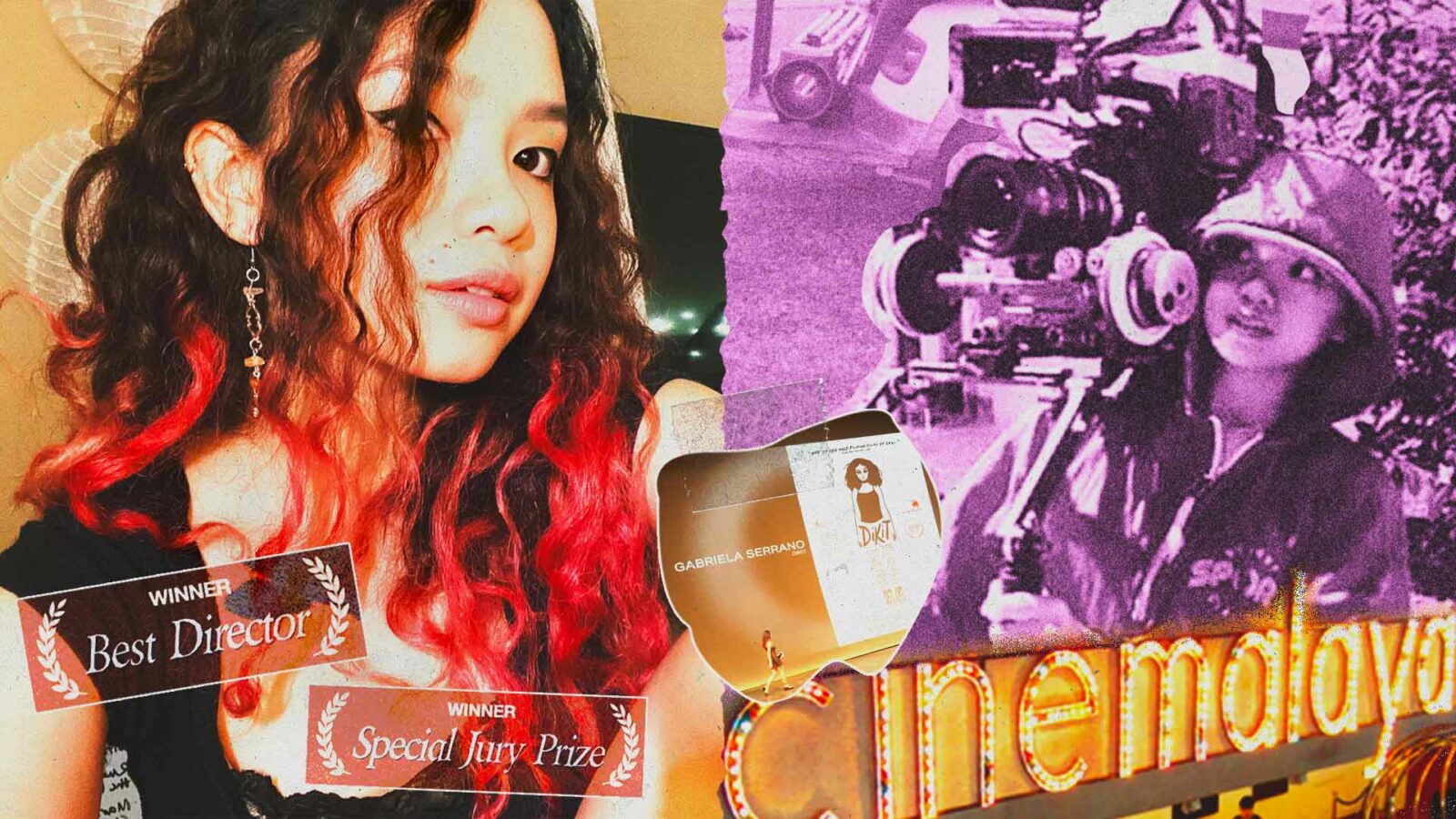While Gabriela Serrano hit the jackpot with her acclaimed feminist take on the manananggal, this is just the start of a very promising career.
Related: Lights, Camera, Action: Meet The Women Directors That Are Changing The Way We See Cinema
Any filmmaker would hope that their debut film does well. While some of the biggest directors in the world get their big break only later on in their career, others see critical acclaim right from the jump that launched their careers. For Gabriela Serrano, she very much is part of the latter group. While she always had a passion for films and filmmaking, she didn’t immediately enter the profession. It was only in 2021 that she decided to finally make her very first movie, Dikit, and it was definitely a dazzling debut. What started out as a remake of a Jose Nepomuceno film quickly became a breakout hit, was screened in festivals in and outside the Philippines, bagging numerous awards in the process. And as she tells it, Gabriela is just getting started with her career and ready to tell more women-focused stories with her newfound platform.
HER START
As a child, Gabriela was already exposed to film thanks to her cinephile parents, both of whom are part of the creative industry. “My parents really exposed me to good cinema. Not just good cinema, but all kinds of movies, and even things I think weren’t appropriate for me as a child,” she quips in an interview with NYLON Manila. While some would see a movie just for its entertainment value, that didn’t apply for Gabriela. Instead, she saw films in a deeper light.
“They weren’t just entertainment for me, but on every film I watched, even as a child, I felt like something I could learn from emotionally or artistically.” She also credits her passion for documenting her life moments that led her to filmmaking. “I was always just documenting things on my camera from a young age. It’s kind of a nervous thing where I’m always anxious about like letting memories pass by without documenting them or keeping a log of. I was always taking videos, always taking pictures since grade school.”
Still, filmmaking wasn’t the first job she took out of college. “I’m actually started out as a colorist,” shares the multimedia arts graduate. “My first job out of college was junior colorist in a post-production studio here in Manila. And I mostly worked on commercial projects.” As her creative career continued though, she soon became part of the crew for a few films and shows, often serving as an editor, something she holds a great passion for.
“I was still working as a colorist during that time, I started editing on the side. And editing is something I’ve had been doing since high school, all throughout college. Even though I didn’t take film as my course, I always loved editing. And I consider it my bread and butter as a creative or as a filmmaker up to now.” Her numerous run ins and experiences working with professionals in the industry inspired her to pursue being a director herself. “I was really happy with my work and I wanted to continue editing professionally. But then I also started thinking, why not use this point in my life to try to maybe direct like I always wanted.”
FINDING DIKIT
While it may be one thing to become a director, it’s a whole other game to make that debut film a reality. As Gabriela shares, her foray into filmmaking wasn’t easy as she struggled for a few years finding her style and that perfect project. Like most young creatives, Gabriela was still trying to find her voice. But she eventually found that thanks to a silent film festival. In 2021, the Film Development Council of the Philippines was set to hold their annual Mit Out Sound Silent Film Competition. The FDCP put out a call for pitches to remake classic Filipino silent films. Winning pitches would get a grant to make the movie and those films would be screened at the festival.
She saw this and on the list of ten films to choose from, she gravitated towards Jose Nepomuceno’s The Manananggal. But, because there were no existing copies of the film, she and her sister, who co-wrote and stars in the movie, had to do some heavy research. “We really tried to do research. You really couldn’t find any information on the film. Like even plot wise. There was really nothing about it other than the fact that it was the first horror film in the Philippines and the first Filipino film that utilized practical effects.” These aspects stood out to her, and also because of the film’s take on Philippine folklore. “Among all the other films on the list, I was like, I think I want to do something within this vein.”
She continues, “I also gravitated towards it because I come from a very superstitious Catholic family. And then we have roots in Laguna. So, I’m very familiar with the legends. And I was just thinking when I was developing the script with my sister that all these legends were passed down in our family by women.” It was this female aspect that Gabriela was wanting to change for her version. While most media and stories portray the manananggal as an evil woman, she wanted to depict hers as more of a misunderstood creature. “Why don’t we make the woman creature an antihero instead of the villain.” She and her sister sent in their pitch and were chosen as one of the ten films.
BAPTISM BY FIRE
Ask anyone in the film industry what it’s like to make movies, they’ll tell you it’s not easy. That much was true for Gabriela who described her shooting experience as the “scariest undertaking.” While most of the cast and crew were people she knew, that didn’t make things easier, especially since it was her first time at the director’s chair. “I’ve been on different shoots so I kind of knew the ropes. But then this was the first time really helming a production as the director. And that was really nerve wracking to me. Number one, I had never done it before. And number two, I felt like I had been waiting so many years to finally try and do the opportunity, I felt like I had to prove myself.”
It was a ragtag group of crewmates and cast to say the least. Her family even worked on the movie with her dad doing production design and her mom handling coordination. “The pressure was huge, because we were given a grant. So, we had to make sure we saw our plans for the film through. And then aside from that, there’s also all the logistical stuff. And I keep saying it was like a baptism by fire working on this film, because it was.” Aside from relying on a small crew to handle many tasks, they were also filming at a time when the country was charting record COVID-19 cases. Oh, and the set was partially ruined by a typhoon.
Still, they managed to make it work. “We pushed our schedule back and extended another day. So, logistically, it was a nightmare. On top of it being everyone’s first time working on a film. It’s still such a miracle to me that we even finished it.”
ACCLAIM AND RECOGNITION
The final output became Dikit, a silent short film that followed a young woman, who so happened to be a manananggal, longing for a new body. When a new couple moves in to the neighborhood, she sees her chance but finds herself dealing with some complicated feelings. Upon its premiere at Mit Out Sound in late 2021, the movie was received with critical praise with many complimenting the film for its queer feminist take on a character that is often depicted as one-dimensional. Despite having zero dialogue, the short movie said so much.
The slow-burn horror film quickly became a fan favorite and took home Best Film and Best Director at the 2021 Mit Out Sound Silent Film Competition. The hits just kept on coming for Dikit and Gabriela. The film made its international debut at the at the Los Angeles Asian Pacific Film Festival in May of this year. CNN Philippines Life named Dikit as one of the best movies of 2021 and Gabriela as a young filmmaker to watch out for.
Dikit was then included at the 2022 Cinemalaya short film line-up where it took home the Special Jury Prize for short feature and Gabriela winning Best Director for a short feature. “For pushing the frontiers of feminist cinema through its creative raid and engaging reimagining of Philippine folklore,” reads the praise Cinemalya gave Dikit. At just 26 years old, Gabriela scored herself an acclaimed and award-winning debut short film, an experience she admits she’s still trying to get used to.
“I’m very pleased, of course, I’m over the moon. I’m really glad because I think me and my sister tried really hard to make it very human, very personal. So, that’s the most important thing to me is that people were able to resonate with it. But personally, you know, being a first time filmmaker, and experiencing like this whirlwind of good things with our first film, there’s also the sense of chamba. It’s like, at times, the imposter syndrome kicks in. But I was also just very lucky on this. I’m thankful that lots of people have related to the characters and have seen themselves in the story, despite it being such a mythological, super non-realistic thing.”
FOR WOMEN, BY WOMEN
As of this writing, Gabriela is currently at work on her next project. She has a couple of ideas in mind that are in early scriptwriting stages with the ball rolling sometime next year. While she wouldn’t share exactly what her next project will be, she hopes it will follow the same vein as Dikit, narrative-wise that is. “I’m definitely hoping to try again with unconventional storytelling, hopefully use that as a lens through, which we can talk about issues that are very important to me like feminine identity, family in the Philippines, growing up, and trying to figure out who you are.”
Aside from working on her own blossoming filmmaking career, Gabriela is also part of the recently launched Street Woman Productions, a production house led by women and non-binary individuals. It’s background and mission is of a particular pride point for Gabriela. “I think it’s definitely time now for young girls, young non-binary people, trans people, and queer people to represent and to really band together. And I think it’s really cool that a lot of these emerging filmmakers are women, are non-binary, or trans or queer. And I’m really happy to be part of a group that’s championing that.”
The past few years have seen the conversation around the need for more female representation in media, especially in the West. And while that also applies here, female representation in Philippine cinema, both infront and behind the camera, has seen women lead all levels. It’s this aspect that Gabriela is ready to follow. “I’m really proud to be part of a local filmmaking industry where women, I feel, really take the lead. So, I’m glad to be continuing on in that legacy, somehow, as a filmmaker now. I’m excited for more female filmmakers to make their films and win their awards.”
More importantly, she’s ready to use her movies as a vehicle to tell more women-focused stories and explore the vast lexicon of what it means to be a woman in this day and age. “I would just hope to make films that address women’s issues that are not often talked about like women in the working class, women who aren’t seen in the telenovelas, weren’t seen in general. There’s so many stories to tell about women in the Philippines.” As for genre, she’s open to any, but she’s also down to revisit horror and fantasy as a way to comment on real life issues.
BE OPEN TO THE WORLD
As for her advice for other creatives and filmmakers, she wants them to start being aware of the world “Be as perceptive and as open as you can to the life around you. I think there’s so much distraction in the world right now. And I think young filmmakers should always just be absorbing, processing, and reinterpreting all these events and feelings they’re having as clearly and as often as possible. I think the best way to do that is just by documenting and keeping a diary. Just listening to everything around you, looking at everything with with like a hyper focus. I feel like that’s the only way you can get like, the angle to your own film that will be true to you.”
She adds, “If you’re honest with yourself, it’ll resonate with everyone else. So, I would say that my advice is just to be honest. And be clear on your intentions as an artist and keep making. As long as you keep nourishing your creative mind, eventually you’ll get there.” Finally, as for those films to help you get those creative juices flowing or just worth seeing in general, Gabriela recommends two, the first is Dwein Baltazar’s highly underrated Oda Sa Wala. The second is the Thai drama, By the Time It Gets Dark.
To think that Gabriela got her start in films thanks to a remake of a silent film that she herself hasn’t seen is a movie onto itself. But thanks to her ingenuity, craft, creativity, and talent, she turned a simple story of a manananggal into a feminist ode to love and acceptance. Her career has definitely just started with Dikit serving as a preview of what promises to be an exciting new filmmaker ready to have all forms of women take center stage in her movies.
Continue Reading: Meet Irmay Ledesma, The Creative Mind Behind SB19’s Pagsibol Era Visuals





